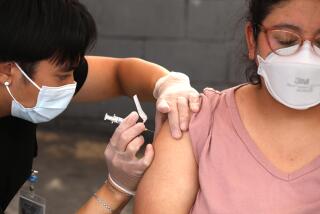Under Attack From the Seasonal Sneezes
If you are among the one in six Southern Californians prone to allergies, brace yourself for a sinister sneeze season.
Allergy experts predict that the next few months--traditionally considered the peak allergy season--could be especially miserable. The heavy spring rains have spurred the growth of indoor and outdoor molds, tree pollen counts are on the rise and, later this month, grass pollens are expected to increase.
But “it isn’t just what’s growing locally that makes us sneeze; winds can carry pollens here from as far away as the desert,” says Sharron Reynolds, spokeswoman for the Asthma and Allergy Foundation of America, Los Angeles chapter.
Allergists acknowledge that we’re still a long way from a magic allergy antidote, but a sniffling patient can relieve the misery:
* If you self-treat allergy symptoms with over-the-counter medication like decongestants, ask a pharmacist to help you pick the right formula.
* Do not abuse over-the-counter medicines. “For nasal stuffiness, use over-the-counter decongestant nasal spray for only three to five days, 10 days maximum,” says Gary Rachelefsky, a Los Angeles allergist and associate director of UCLA’s Allergy-Immunology Training Program. Long-term use can affect the nasal membranes, setting you up for infection.
* Do not assume the dose on the label of over-the-counter medication is right for you. If you weigh less than 150 pounds, you may need to reduce the recommended dose to avoid becoming sleepy or hyperactive, says Robert Ziering, a San Diego pediatric allergist and associate professor of pediatric allergy at the UC San Diego School of Medicine.
* Reduce allergens at home by keeping pets outdoors, since pet dander can be a potent allergen. If you are especially sensitive to airborne allergens like tree pollens, change your clothes after spending time outdoors. Don’t stop at vacuuming the floors. “Vacuum the comforter or bedspread after the floors,” Ziering tells patients. “Dust the furniture later, using a damp or oil cloth.”
* Don’t assume your sneezes and sniffles stem from food allergies. Allergy-prone adults often think they suffer food allergies and manipulate their diets without professional advice, Rachelefsky says. “Food allergies are actually very rare in adults. And the symptoms are rarely subtle. If you are allergic to peanuts, for instance, you will probably have hives, wheezing or other symptoms within a few minutes.”
* Know when to give up on self-treatment. See a doctor, Rachelefsky advises, when allergies interfere with your life, sleep or work or if you have complications from allergies like sinus problems, ear aches, ear infections or headaches. An allergist may recommend new prescription antihistamines, which do not induce as much sleepiness as older medicines. Regular allergy injections can also provide relief.
Rachelefsky warns: “People with allergies who have chest discomfort when they run, play tennis or do other vigorous exercise should tell their doctor as soon as possible. They may have exercise-induced asthma.”
ALLERGY HELP LINES: Toll-Free Sources for Respiratory Aid
For information about allergies, call the Asthma and Allergy Foundation of America, (800) 7-Asthma, or the Asthma & Allergy Foundation, Los Angeles chapter, (800) 624-0044.
For referrals to board-certified allergists, call the American Academy of Allergy & Immunology, (800)-822-2762.
More to Read
Sign up for Essential California
The most important California stories and recommendations in your inbox every morning.
You may occasionally receive promotional content from the Los Angeles Times.










